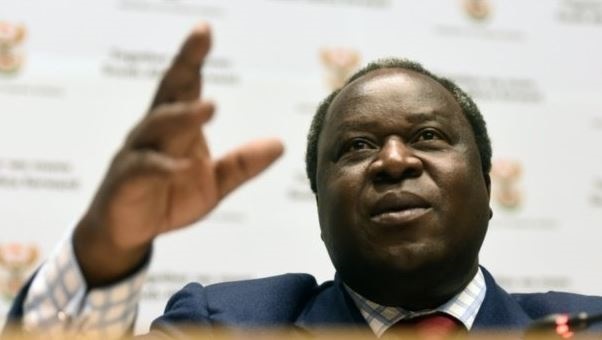
The country has been spending more than we earn. That was the gist of Finance Minister Tito Mboweni's speech before Parliament in October, when he tabled his medium-term budget policy statement.
While the minister announced plans to take a hardline against bailouts for state-owned enterprises in his national budget speech in February – efforts to contain the state's growing debt came to naught by the time October arrived.
According to Treasury's latest estimate, South Africa's national debt stands at R3trn. Treasury has warned it could grow to R4.5trn by 2022/23, or 71.3% of GDP, Fin24 previously reported.Following his medium-term budget policy statement, Mboweni told members of Parliament that the country was in dangerous territory with debt galloping towards 80% of GDP, which will burden future generations. The debt burden is also a key concern for rating agencies.
With the country tiptoeing against a projected budget shortfall of R52bn for the current fiscal year, Fin24 looks at how some of the measures the finance minister announced to trim the fat, and how things ultimately panned out.
1. Slashing the public sector wage bill, from the top
Mboweni, in his February budget, announced measures to reduce the public sector wage bill by R27bn over three years by incentivising early retirement, reducing performance bonuses and freezing come salaries. But by October, at the time of the medium-term budget policy statement, these plans did not work out.
In the mid-term budget Mboweni introduced new guidelines for salary packages for Cabinet and provincial executives – such as capping the value of cars at R700 000 – inclusive of VAT, restricting domestic flights to economy class and a wage freeze – with salaries likely to be adjusted downwards.
"After adjusting for inflation, the average government wage has risen by 66% in the last 10 years," Mboweni said at the time. The cuts are expected to save the fiscus R150bn in three years.
2. Strict terms and conditions for extra funding
Mboweni was adamant that state-owned enterprises facing financial challenges would not get bailouts. Any funding provided to them would require that strict conditions are met.
For example, while the SABC had sought a R3.2bn lifeline from government, Mboweni stressed that Treasury would not budge unless it was certain steps were being taken to improve the organisation's financial health.
While the SABC reported a R483m loss for 2018/19, the board previously told Parliament it managed to stay afloat through the successes of its turnaround plan. However, the organisation remained technically insolvent and required a capital injection from government to bolster the efforts of its turnaround plan, Fin24 previously reported.
By October, government had agreed to give the national broadcaster R2.1bn, as part of the R3.2bn it requested - as the organisation only met five of Treasury's eight preconditions for funding. The remaining R1.1bn will be channelled to SABC once it has met the remaining three conditions.
In August this year government also extended a R1.8bn lifeline to state arms manufacturer, Denel to aid its turnaround plan. Denel had sought a lifeline of R2.8bn. The remaining R1bn will be considered in the 2020/21 budgetary process, Denel said at the time.
The state-owned arms manufacturer also faced liquidity challenges during the year, warning it would no be able to pay its staff their July salaries this year. However, it received bridging finance to do so.
But even the best-laid plans don't always work out - apart from the R5.5bn Treasury allocated to South African Airways (SAA), later in the year government also agreed to take on its R9.2bn legacy debt - to paid off over the next three years. In early December the airline was placed in business rescue; following an eight-day strike by unions which resulted in losses of R50m per day. Government has committed to provide it R2bn in funding to keep it operational.
3. SA Express should be closed
Mboweni is not keen on keeping SA Express open. In a briefing to members of Parliament, following the medium term budget policy statement, Mboweni said that it made more sense to to close SA Express or fold it into another airline in which SAA has an interest – Airlink.
"We are quite convinced we should close SA Express," the finance minister said.
SAA owns a 3% share in Airlink, a direct competitor of SA Express. "There is no logic whatsoever in having SA Express and Airlink competing with one another, while SAA owns 3% of Airlink," Mboweni said at the time. The minister of public service and administration is dealing with this matter.
SA Express reported a net loss of R590m for the financial year ended March 2019 and has a net liability position of R374m, as Fin24 previously reported. It received a disclaimed audit opinion from the Auditor General of South Africa. AG Kimi Makwetu said there was insufficient evidence in the airline's financial statements to conclude it can continue as a going concern.
4. User-pay principle must apply
Mboweni did not mince his words when it came to e-tolls, it even landed him in a Twitter war with Gauteng's legislature.
While Mboweni is of the view that the user-pay principle must apply and that government needs to yield a return on its investment in the Gauteng Freeway Improvement Project (GFIP), Cabinet has not yet reached a consensus on how to address the funding of the project.At a post Cabinet meeting media briefing in December, Minister in the Presidency Jackson Mthembu said that the final report with recommendations on the issue was submitted by Transport Minister Fikile Mbalula. Cabinet is not yet done deliberating on the matter.
"A final decision on recommendation on GFIP, as contained in the report, will be made in the new year by Cabinet," Mthembu said. Cabinet is likely to reach finality on the matter" in its next meeting, next year.
In a separate matter - Mboweni has also joined the chorus of government officials urging the public to pay for services rendered by municipalities - given the outstanding debt owed to waterboards and Eskom. Culprits also include government departments who have failed to pay relevant service providers. In late November the power utility warned it would cut off daytime power to three Free State municipalities, including Bloemfontein, unless they settled their power bills. Later in the month the two sides reached a payment agreement.
5. Eskom's restructure
The biggest drain on the fiscus is debt-ridden power utility Eskom. Mboweni announced an all-important restructure of the power utility which will see it broken up into three entities – generation, transmission and distribution.
Government has allocated R230bn to Eskom over 10 years. While Treasury initially allocated Eskom R69bn over the next three years – additional funding had to be brought forward to help Eskom maintain its going concern status.
The president has signed a special appropriation bill which would see Eskom receive an additional R59bn over the next two years.It was expected that Mboweni would also make announcements on debt relief for Eskom – but the minister held firm, barring any debt relief until the power utility can demonstrate some improvements.The Chief Reorganisation Officer, Freeman Nomvalo, who was appointed as part of the conditions placed by Treasury to help manage Eskom's reconfiguration, is expected to submit his report by the end of the year. The CRO is considering options on how to deal with the power producer's R450bn of debt.
The department of public enterprises' Deputy Director General, Makgola Makololo told members of Parliament that Mboweni will then make further decisions on dealing with Eskom debt if he is satisfied with the way Eskom has been dealing with fundamental issues, Fin24 previously reported.
Eskom hit an operational low earlier in December when it introduced stage 6 load shedding due to technical failures at Medupi power station, and other issues such as the lack of maintenance at ageing fleets. Government is working on finding ways to bolster Eskom's capacity with an additional 5 000 MW which can potentially be provided by Independent Power Producers.
https://www.fin24.com/Economy/South-Africa/5-ways-mboweni-tried-to-trim-the-fat-in-2019-20191230

















